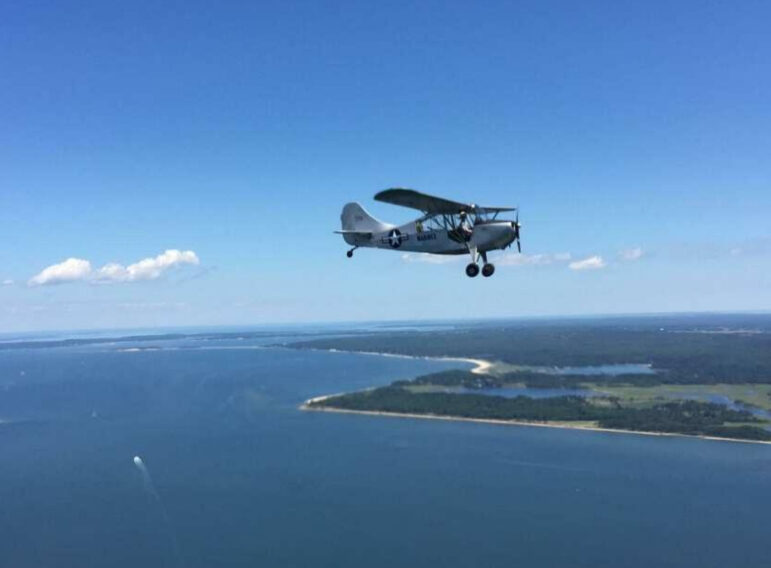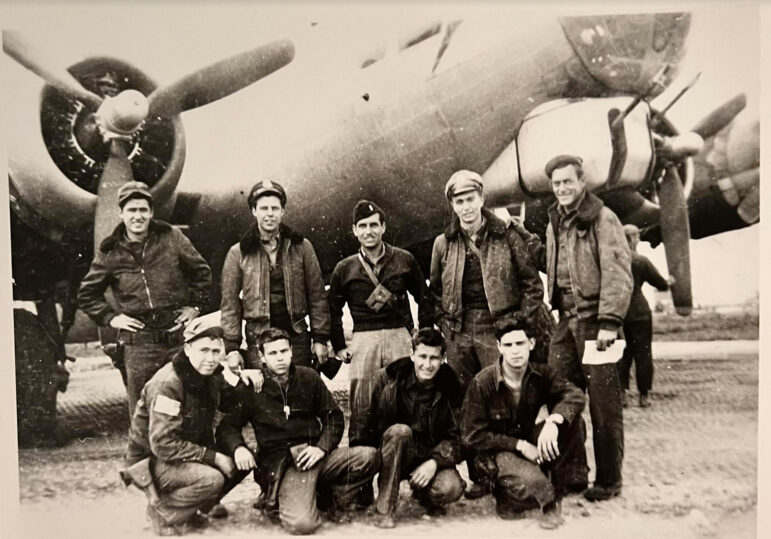By Karen Fassuliotis
Before he died, William (“Bill”) Fassuliotis, a World War II Army Air Corp veteran, discussed his funeral wishes with his wife, Despina, and daughter, Karen. As part of those wishes, he expressed a desire for a military funeral with a live bugler (the Air Force currently plays taps at military funerals using a prerecording) and, although he knew it was a pipe dream, a military fly over at his gravesite. At his funeral this past May, his family, thanks to Ken Pond, who is also a volunteer firefighter in town, was able to honor his request for a live bugler, but the Air Force stopped supplying military flyovers for World War II veterans a long time ago.

At his wake, Karen made mention of her dad’s longing for a military flyover to Ben Bianco, an attorney who lives in town and who is the husband of Greenwich Board of Education member Karen Kowalski. As they were talking, Ben told Karen, “You know, I own a vintage World War II plane. It’s too late to do a flyover at the funeral, but let’s talk.” Bianco owns an Aeronca L-16A, a trainer plane that was used to teach American pilots headed for combat in the 1940s. Ben wanted to do something to honor Bill’s service and felt a memorial flight would be a great way to do so. The two later decided a perfect time to arrange a flyover over Putnam Cemetery would be on July 25, 2022, on what would have been Bill’s 98th birthday. If the weather cooperates the flyover will happen this Monday.
When Bill Fassuliotis was 17 years old, the Japanese bombed Pearl Harbor and the United States entered World War II. As a member of the Junior ROTC at Lincoln High School in Brooklyn, after he graduated high school, Bill immediately enlisted in the Army Air Corp, but, as he was only 17, he had to wait until he turned 18 before he was inducted. Less than a year after the US entered the war, Bill left Brooklyn as an Army Air Corp cadet, a journey that would take him to various bases in the United States as he trained to become a pilot. Despite scoring high on every test that they threw at him in training and more than 60 hours of flying time, his dream of becoming an Army Air Corp pilot was thwarted by a flying instructor who declared he was “to cautious” to become a pilot. Disappointed but not daunted, Bill studied to become a navigator.

His entire World War II experiences, from boot camp to the end of the war, are chronicled in letters to his family that his sister, Theodora, had saved and were found after she died. They are a treasure trove of a young man’s journey during wartime. Bill’s wife of 69 years, Despina, has lovingly transcribed all of these letters and hopes to publish them in a book soon.
As a new navigator, in late 1943, 2nd Lieutenant (on March 25, 1945 he was later promoted to 1st Lieutenant) William Fassuliotis was assigned to fly in the B17 Flying Fortress with the 5th Bomb Wing of the 15th Air Force in Lucera, Italy, initially as a part of the 301 st Bombardier Group, 419th Squadron. He was later assigned to the 483 rd Bombardier Group based in Foggia, Italy.
Bill flew 18 sorties into enemy territory in Europe, including Berlin, Austria and Yugoslavia.
Here is an excerpt from his letter home dated May 27, 1945
“Mother, you have written many ties and you asked me many times if I’ve gone to enemy targets. I didn’t write you before, while the war was going on, because I didn’t want to worry you. I’ve gone on 18 sorties against the Germans. In other words, we have bombed 18 times.”
Bill goes on to write about his bombing run over Berlin:
“The most nervous trip we took was the time when our group…was to bomb Berlin…[W]e thought it was a joke because from Italy they never sent airplanes to drop bombs that far away. But it wasn’t a joke…We were going to surprise them because they had few anti-aircraft guns, but they do have German aircraft without propellers, that is jet airplanes…[W]e were lucky because we were flying at 27,000 feet…[but] we lost 6 airplanes this time…[O]ne of our engines was hit, and we were able to return okay.”
Bill’s crew also saw action over Austria. He wrote:
“I’ve gone 4 times to Vienna Austria, and I must tell you that was the worst place we went because they had 326 anti-aircraft guns against our airplanes. In order to drop your bombs you had to go through most of the anti-aircraft fire…The only thing that happened was we lost one engine but no one was injured on our airplane.”
And then there was the time, on April 1, 1945 when they were scheduled to bomb a bridge in what was then known as Yugoslavia:
“ [The bridge] had 26 aircraft guns there and we thought that our mission would be easy. When we reached the target…the clouds were worse than they had told us…and we couldn’t drop our bombs. They didn’t hit us the first time but we went around again a second time and a third time but we never accomplished [the drop]. We had to drop our bombs but didn’t know where they went because at this time we had lost two engines. With only two engines and one leaking oil we left our group and went to an emergency field in Yugoslavia 18 miles from where the Germans were fighting…[Our crew was] lucky because we lost quite a few airplanes for such a small target.”
His crew, protected by men and women of the Yugoslav Partisans, made it back to Italy to fly another day.
In recognition of the missions he flew, on May 2, 1945 he (and the rest of his crew) was awarded the AM/10LC Air Medal with Oak Leaf cluster.
After his discharge from active duty, Bill remained in the Air Force Reserves where he achieved the rank of Captain in 1958. He retired from all military service in 1961. Like most World War II veterans, he never spoke of his wartime experiences and went on to marry the love of his live, raise a family, and have a successful business career. He also served Greenwich as a town constable.
*Weather permitting, the flyover over Putnam Cemetery to honor Bill and his service to our country will happen on July 25th. So, if you hear or see a vintage plane flying over Putnam Cemetery, Bill’s family hopes that you will stop what you will doing, look up, and remember a man, (as well as all the other men and women who have served through the generations) who fought for our country and for the world’s liberty during World War II as part of the greatest generation who ever lived.
*UPDATE: The forecast for Monday is for showers and thunderstorms. The flyover is tentatively rescheduled for 4:00 pm on Tuesday, July 26.